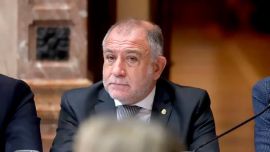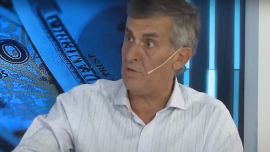There’s a specific modus operandi through which Javier Milei gets rid of his former friends.
There had been indications as to this previously, most notably in journalist Juan Luis González’s unofficial biography of the anarcho-capitalist president, El Loco, and in public comments by his former friend and co-author, economist Diego Giacomini. The first libertarian president of Argentina has zero tolerance for those that were once close to him, and for whatever reason have shown to have a different point of view. His reaction is fierce, and while in a previous stage of his life it meant ostracism more than anything, today with the full power of the state, it has the capacity to produce a long lasting wound.
In a post on social network X (formerly Twitter), Milei wrote: “THE ORIGIN OF TREASON. One of them betrayed in order to swipe confidential information to make his consultancy firm more profitable. The other one did it after failing to impose his agenda for personal gain. There are many analysts that are naïve and/or intellectually dishonest.” His post was immediately distributed to hundreds f thousands of followers, eliciting the response of several of his leading synthetic henchmen, who then move to digitally lynch those cast out of the Garden of Eden of Milei’s anarcho-libertarian dystopia. The president was accusing his, up to very recently, friend Teddy Karagozian, one of Argentina’s leading textile businessmen, and Fausto Spotorno, an orthodox economist ideologically close to the president. Both of them were part of the elusive Presidential Advisors Committee, presided by economist Demien Reidel. Other members include entrepreneurs Alec Oxenford and Eduardo Bastitta Hariet, businessmen Sebastian Braun and Julio Goldstein, economists Ramiro Castiñeira, Miguel Boggiano, and Ariel Cormberg, and financier and former political partner Ramiro Marra.
It isn’t exactly clear what the Committee does, or who is a member, as many who had been named by spokesperson Manuel Adorni claimed in private that they had heard themselves mentioned in the news. Reidel, who is becoming an increasingly influential figure in the president’s inner circle, is supposedly centred on longer-term issues such as transforming Argentina into a hub for artificial intelligence, while helping the president “re-write” economic theory in a way that will win them the Nobel Prize. Together. Yet Spotorno and Karagosian seem to have been, first, expulsed from the Committee, and later publicly accused of improprieties by the president, for disagreeing. In both cases, they expressed critical views of the policy path and strategy chosen by Economy Minister Luis ‘Toto’ Caputo. After their fall from anarcho-capitalist grace, both were extremely respectful of Milei and the rest of the Committee, wishing them luck. In some way, they had been effectively disciplined through fear.
The voracity with which dissent is crushed within Milei’s troop has the effect of disciplining the cabinet and its officials, according to off the record comments by many of them. It isn’t entirely clear whether sister Karina is behind the purging, potentially with the help (manipulation?) of star adviser Santiago Caputo, or if it’s the president himself calling the shots. There are a few untouchables, beyond the aforementioned, there’s ‘Toto’ Caputo, Human Capital Minister Sandra Pettovello, Security Minister Patricia Bullrich, newly minted Deregulation Minister Federico Sturzenegger, and vice-president Victoria Villaruel, who is playing her own game. Outside of that group, everyone’s neck is on the line, constantly. The ousting of former Cabinet Chief Nicolas Posse, a long-lasting friend of the president, served as evidence that everyone is under observation.
Indeed, Argentina’s ineffable spy agency has been restructured once again. Reports suggest Posse was ousted in part due to a conflict with Santiago Caputo regarding the spy agency and its reserved funds. Yet what’s true is that the spy agency has been brought under Caputo’s sphere of influence, where its original name was restored, going from Federal Intelligence Agency (AFI) to State Intelligence Secretary (SIDE), bringing back memories of some of the darkest days of Argentine espionage. The new “Señor 5,” as the head of the spies is known, is Sergio Neiffert, a man with close ties to the Caputo family and zero experience in intelligence and espionage. Argentine politics has a long history of using the intelligence agencies for political espionage and extortion. In this new, synthetic era, Milei and Caputo’s SIDE will now count with a Cybersecurity unit headed by cryptocurrency expert Ariel “Wata” Waissbein. It isn’t clear whether there’s any connection between the digital communications teams that works in the Casa Rosada, the “troll army,” and the new unit, beyond rumours that reserved funds were used to finance those teams.
The knee-jerk reaction to any criticism of the economic policy path could be a reaction to the jitters being felt throughout financial markets, forcing the administration to commit a series of communications errors that have put pressure on Milei and ‘Toto’ Caputo. As they announced the second phase of their plan, the peso-dollar exchange rate started exhibiting intense pressure, particularly regarding the so-called black market premium, which is the difference between the official exchange rate and the blue chip rate. At the same time, the value of financial assets fell, along with bond prices, increasing Argentina’s country risk premium. All of this hit at the centre of the plan which has as a top priority to continue to lower inflation. The short-term solution would be some level of devaluation, which in turn would feed into inflation given the strong pass-through effect that occurs in Argentina. Ultimately, Toto and Milei decided to intervene in currency markets while accusing banks of engaging in a “market coup” to topple the government. Nothing farther from the liberal-libertarian ideology espoused by the president. If the initial interventions are effective, they should be able to contain the black market premium, but economists across the spectrum are all calling on them to lift the “cepo,” as currency controls are called.
The Milei administration is stuck between a rock and a hard place. It needs to deliver economic results, fast. It risks seeing its public support begin to drop, which would reduce the government’s credibility and therefore erode their capacity to enact policy. They are playing hardball everywhere, picking fights with regional neighbours and international trading partners, and domestically with the whole of the political ecosystem, including potential allies such as Mauricio Macri’s PRO Party. Whether it’s meticulous strategy or a paranoid’s response to fear of betrayal, if it goes wrong it risks dragging the country back into crisis.



















Comments